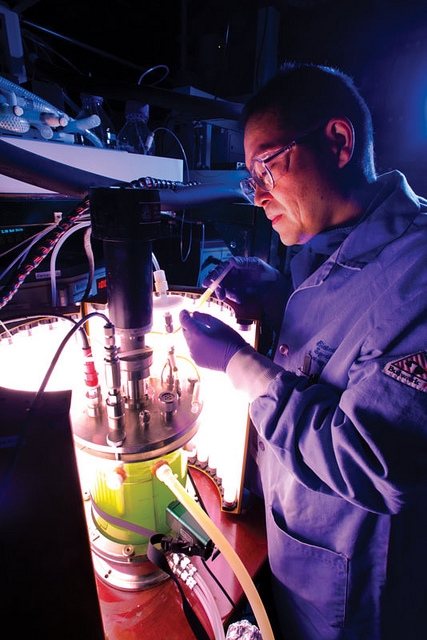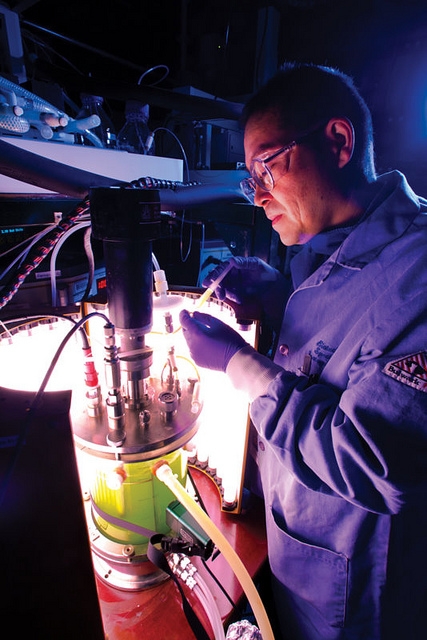
Algae Biofuel: A Promising Alternative Fuel
As we seek to reduce our dependence on oil and to reduce CO2 emissions, scientists have looked to many feedstocks for alternative fuel options. Algae-based biofuel has emerged at the forefront of alternative fuel options. Recent breakthroughs in algae production technology have improved algae’s promise as an economical and environmentally beneficial alternative fuel.
Why Algae?
Algae captures carbon dioxide (CO2) and produces oxygen in the photosynthetic process. By consuming CO2, algae reduces harmful emissions and creates lipid oil. This oil is at least half of algae’s composition, by weight, and can be distilled into fuel that burns cleaner (producing less greenhouse gasses and CO2) than petroleum.
There are many advantages to algae biofuel as an alternative energy. Most notably, algae has the potential to surpass other forms of biofuels in cost effectiveness and capacity for mass production.
Algae is relatively easy to grow at a fast pace in large quantities. With current technology algae can produce up to 300 times more oil per acre than conventional biofuel crops, such as rapeseed, palms, and soybeans.
Biofuel makers claim they will be able to produce more than 100,000 gallons of algae oil per acre per year. This means a relatively small 95 million acres of algae would be needed to replace US’s current petroleum use, in comparison to the billions of acres of land that would be needed for other biofuel products.
Another major advantage of algae production is that it would not compete with crops that could be used for food. This has humanitarian implications as climate change makes food supplies in developing nations more unstable. Algae production does not necessitate the use of arable land or fresh water that could be used for food production. Instead, algae can be grown in waste water to remove harmful substances in the water that would otherwise have to go through an expensive treatment process.
Algae goes on further to recycle our waste. A more recent development has been the use of algae to absorb CO2 emissions. Since Algae consumes a great deal of CO2, biodiesel manufactures are strategically placing their algae plants near coal plants that emit CO2. Coal plant’s CO2 emissions, that would otherwise pollute the air, are pumped into algae tanks where they are consumed by the algae.
Making Algae Cost Competitive
Algae biofuel production technology is emerging out of its infancy, bringing algae to the forefront of alternative fuels. New technology developed by the US based Solazyme Company, has led to the use of genetically modified algae in a fermenting process. With this process, Solazyme estimates that they can produce algae with an 80% oil concentration at a production cost below $3.44 a gallon using a built-for-purpose commercial plant. At this price algae is in the running to become a cost effective commercial product.
The biggest cost hurdle in algae production is developing oil extraction without expensive refining and processing. The oils produced by algae must be extracted and transformed into biodiesel in a cost effective process, using commercially available chemicals. Experts believe that advancements in algae biofuel technology will eventually make algae production cheaper, but for algae to become a cost comparative commercial product, investment is needed.
The US government is one of the largest funding source for algae biofuel development, thanks to stimulus funding. China and India are close behind in their funding for algae research. The Navy recently spent $12 million on 450,000 gallons of biofuel that was used to successfully power a carrier strike group off the coast of Hawaii earlier this year.
Private investors, including oil companies, have also invested in algae research. BP, Chevron Corp. and Exxon Mobil all have investments in algae. The largest private investment is Exxon’s $600 million pledge to Synthetic Genomics. Investors believe that with greater private investment and continued government funding algae refinement technology is likely to become cost competitive at a commercial scale in the near future.
In short, algae has great promise as a fuel that is sustainable, renewable and can be produced at a commercial scale to address our future energy needs. Algae biofuel production directly addresses US energy security and CO2 emissions while not interfering with global food supply.






